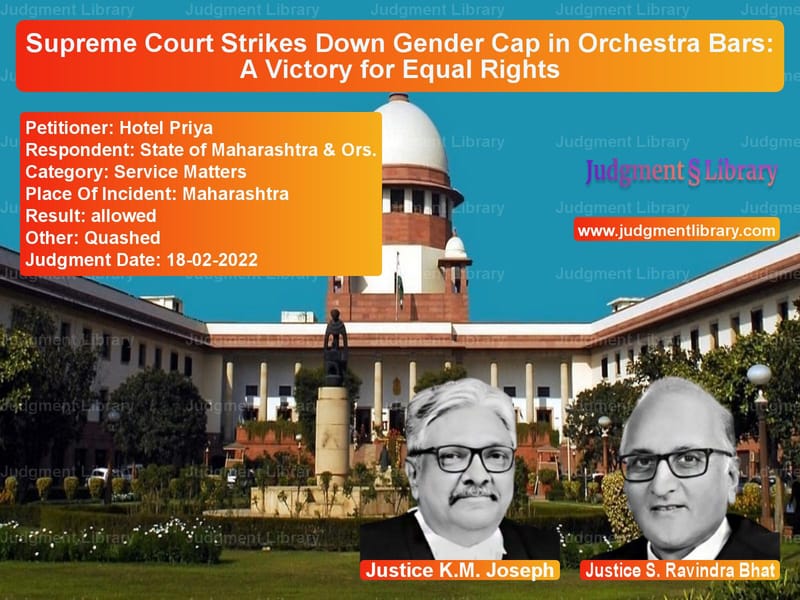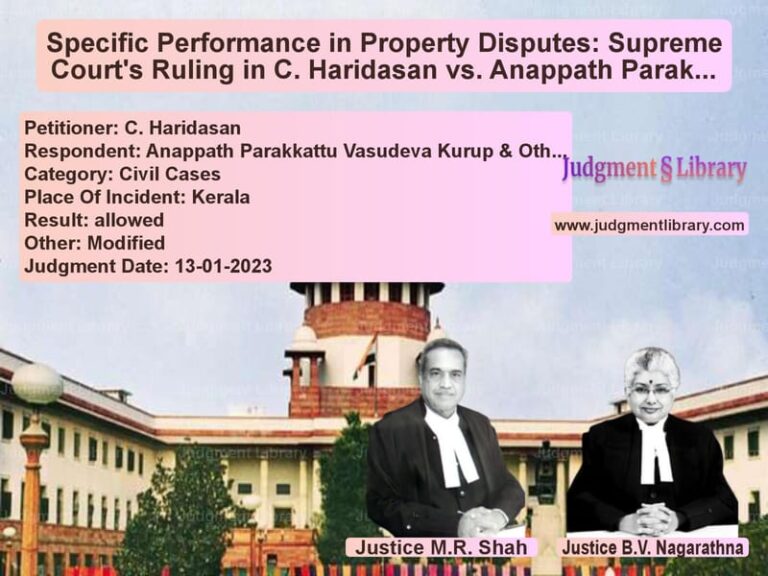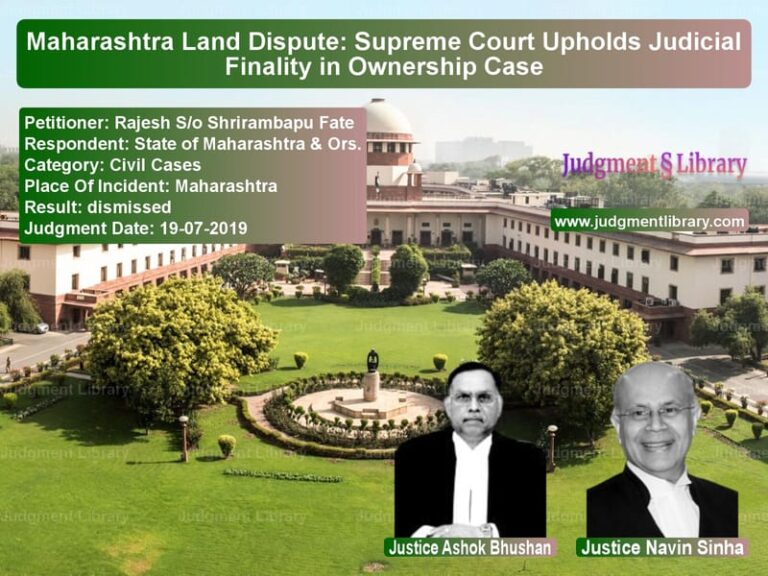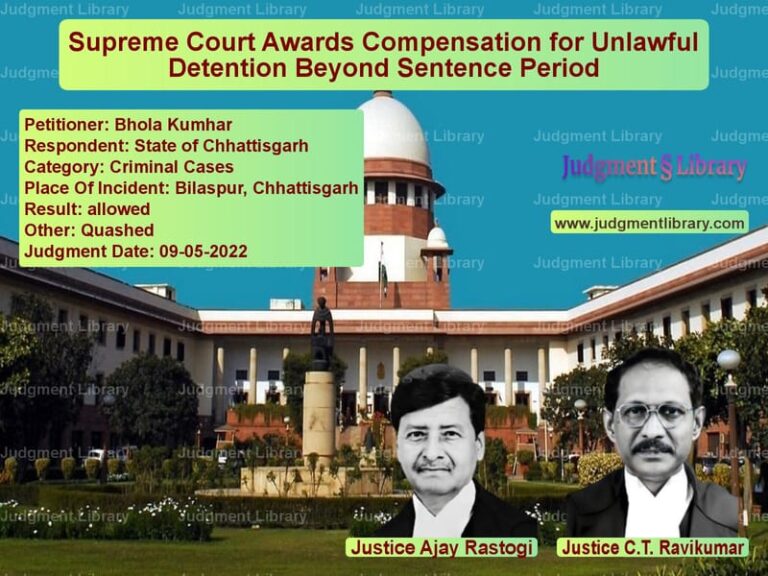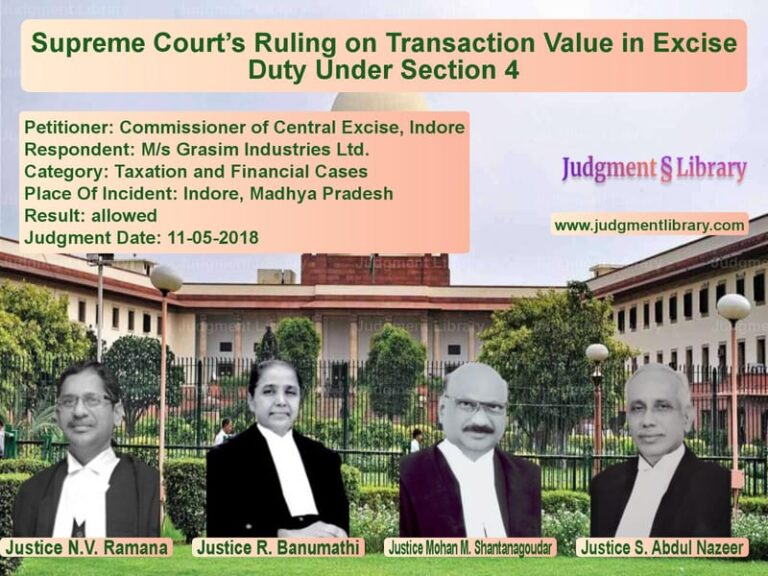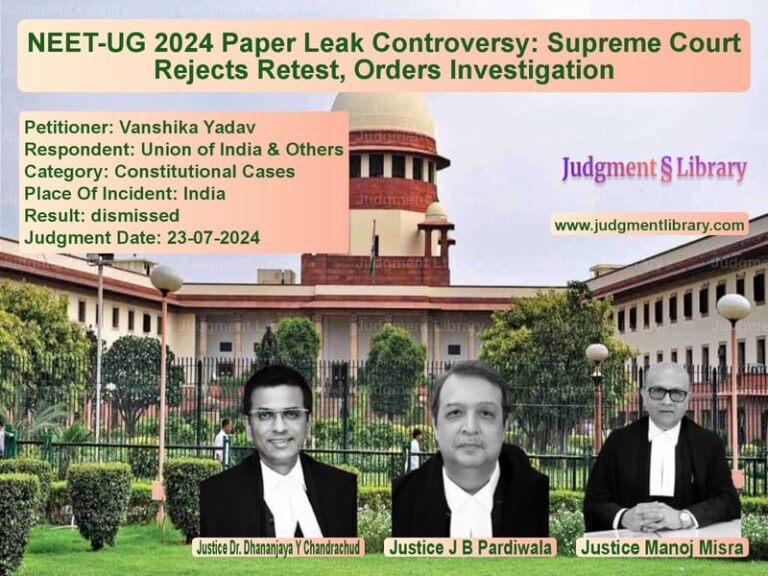Supreme Court Strikes Down Gender Cap in Orchestra Bars: A Victory for Equal Rights
The Supreme Court of India recently delivered a landmark judgment in the case of Hotel Priya vs. State of Maharashtra & Ors., declaring unconstitutional the restrictions imposed by the Maharashtra government on the number and gender composition of performers in orchestra bars. The Court ruled that such restrictions violate Articles 14, 15(1), and 19(1)(g) of the Indian Constitution, which protect equality, non-discrimination, and the right to practice any profession.
The ruling sets an important precedent in labor rights, gender equality, and the regulation of entertainment businesses, ensuring that arbitrary licensing conditions do not infringe upon fundamental rights. Below, we examine the case details, arguments presented by both parties, the Supreme Court’s reasoning, and the broader implications of the judgment.
Background of the Case
The dispute arose when the Maharashtra government imposed licensing conditions under the Maharashtra Police Act, 1951, and the Licensing and Performance for Public Amusement Rules, 1960. These conditions regulated orchestra bars and imposed the following restrictions:
- Orchestra bars could have a maximum of eight performers on stage at any given time.
- The performers had to be in a strictly equal gender ratio (four men and four women).
- The bars were required to maintain gender-segregated green rooms for performers.
- The performers’ entry and exit from the venue had to be through separate doors from patrons.
The appellants, who were owners of orchestra bars, challenged these restrictions, arguing that they were arbitrary, discriminatory, and violated the fundamental rights of both performers and business owners.
Petitioners’ Arguments
The petitioners, represented by senior advocates, put forth the following key arguments:
- Violation of Business Rights: The restrictions imposed by the Maharashtra government unreasonably interfered with their right to conduct business, violating Article 19(1)(g) of the Constitution.
- Gender Discrimination: The cap on female performers violated Article 15(1), which prohibits discrimination based on sex.
- Arbitrary and Unreasonable Regulation: There was no rational basis for the government’s restriction on the number of performers or the equal gender division.
- Precedents from Earlier Cases: The petitioners relied on past Supreme Court rulings, including Indian Hotel and Restaurant Association vs. State of Maharashtra, which had struck down similar restrictions on dance bars.
Respondents’ Arguments
The Maharashtra government defended its regulations with the following justifications:
- Protection of Women Performers: The restrictions were necessary to protect women from exploitation in orchestra bars.
- Public Morality: Regulating orchestra performances was necessary to maintain public order and morality.
- Prevention of Human Trafficking: The government claimed that unchecked performances could lead to illicit activities, including trafficking and forced labor.
Supreme Court’s Analysis
The Supreme Court, after reviewing the arguments, ruled in favor of the petitioners. The Court made the following key observations:
Violation of Fundamental Rights
The Court held that the restrictions imposed by the Maharashtra government were unconstitutional. It observed:
“The right to practice any profession or to carry on any occupation, trade, or business under Article 19(1)(g) cannot be subjected to unreasonable restrictions. The State cannot impose conditions that are excessive or that fail the test of proportionality.”
Gender-Based Restrictions Are Unconstitutional
The Court struck down the gender cap, noting:
“Imposing a limit on the number of female performers while mandating equal participation of male performers is an unreasonable classification. It discriminates against female performers in violation of Article 15(1).”
Regulation Must Be Proportional
The Court held that while the State has the authority to regulate businesses in the interest of public morality and order, such regulations must be reasonable. It stated:
“Regulations must serve a legitimate state interest and should not arbitrarily restrict employment opportunities. The State has failed to provide empirical evidence linking orchestra performances to trafficking or exploitation.”
Previous Supreme Court Rulings
The judgment referenced past cases where the Court had ruled against excessive restrictions on entertainment businesses, including:
- Indian Hotel and Restaurant Association vs. State of Maharashtra (2013), which struck down a ban on dance bars.
- Olga Tellis vs. Bombay Municipal Corporation (1985), which emphasized the importance of livelihood rights.
Final Verdict
The Supreme Court ruled in favor of the petitioners and issued the following directives:
- The gender-based cap on performers in orchestra bars was declared unconstitutional.
- The requirement for gender-segregated green rooms was struck down.
- The government was directed to revise licensing conditions to ensure they do not violate fundamental rights.
- Authorities were instructed to implement reasonable safeguards for the protection of women without imposing arbitrary restrictions.
Conclusion: Implications of the Judgment
This judgment carries significant implications for business regulation, gender equality, and labor rights:
- It reinforces the principle that regulatory restrictions must be proportionate and not infringe upon fundamental rights.
- It ensures that women performers cannot be arbitrarily restricted in their employment.
- The judgment sets a precedent for challenging similar excessive regulations in the entertainment industry.
- It underscores the need for governments to provide empirical justification for restrictive laws, rather than relying on moral arguments.
By striking down the Maharashtra government’s arbitrary restrictions, the Supreme Court has reaffirmed constitutional protections for gender equality and the right to conduct business, ensuring that performers and bar owners can operate without undue interference.
Petitioner Name: Hotel Priya.Respondent Name: State of Maharashtra & Ors..Judgment By: Justice K.M. Joseph, Justice S. Ravindra Bhat.Place Of Incident: Maharashtra.Judgment Date: 18-02-2022.
Don’t miss out on the full details! Download the complete judgment in PDF format below and gain valuable insights instantly!
Download Judgment: hotel-priya-vs-state-of-maharashtra-supreme-court-of-india-judgment-dated-18-02-2022.pdf
Directly Download Judgment: Directly download this Judgment
See all petitions in Employment Disputes
See all petitions in Public Sector Employees
See all petitions in Recruitment Policies
See all petitions in Termination Cases
See all petitions in Workplace Harassment
See all petitions in Judgment by K.M. Joseph
See all petitions in Judgment by S Ravindra Bhat
See all petitions in allowed
See all petitions in Quashed
See all petitions in supreme court of India judgments February 2022
See all petitions in 2022 judgments
See all posts in Service Matters Category
See all allowed petitions in Service Matters Category
See all Dismissed petitions in Service Matters Category
See all partially allowed petitions in Service Matters Category

